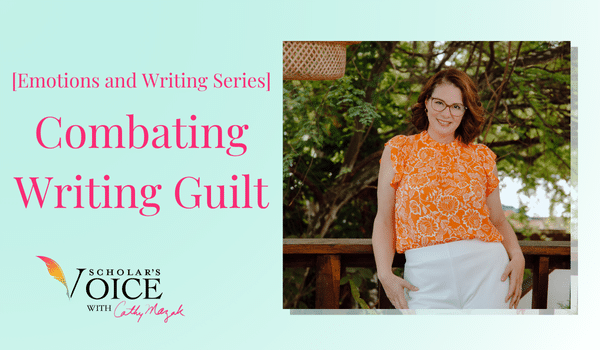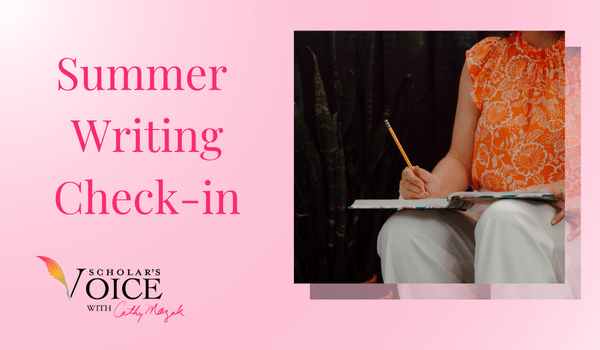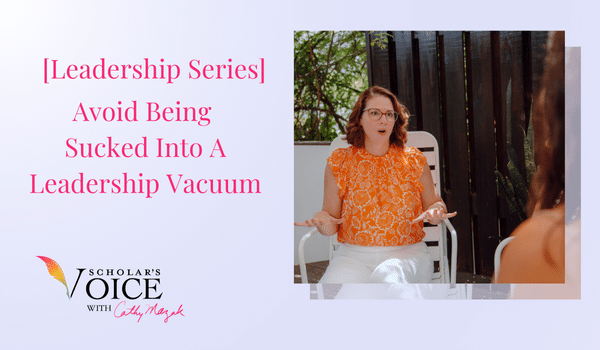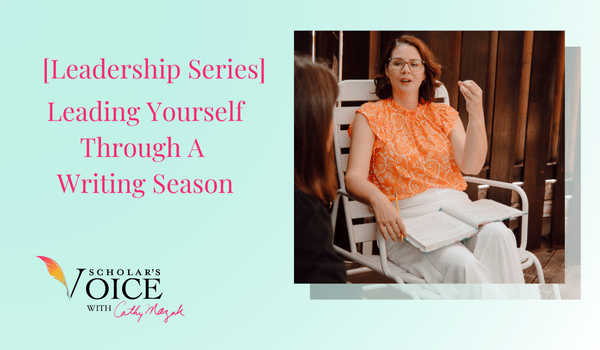[Emotions And Writing Series] Combating Writing Guilt [RE-RELEASE EP 12]

Today’s episode is a re-release of episode 12 of the podcast.
Listen in as I explore one of the most challenging emotional obstacles to academic writing: guilt.
MORE DETAILS
Guilt is the biggest killer of writing productivity. When you feel guilty about something, all inspiration or motivation to complete that task evaporates. Who wants to spend time working on something that makes us feel bad?
Academics, particularly women, often grapple with the overwhelming burden of guilt when they fall short of their writing goals. In this episode, I not only shed light on the pervasiveness of this guilt but also provide practical strategies to transform your mindset and make writing a more positive and fulfilling part of your academic career.
I also review the importance of an Academic Mission Statement as a tool to help reframe your relationship with writing. By clearly articulating the change you want to make in the world through your work, you can start to see writing not as an obstacle but as a central and motivating part of your scholarship. I also share tips on integrating writing into your teaching and research and discuss the importance of investing in yourself and your professional development.
Don’t let misplaced guilt hold back your writing and publications! Tune in for insights on managing and overcoming guilt in academic writing.
Understanding Guilt in Academic Writing
Guilt is the number one complaint academic women make describing their writing practice. We know it is important to center our writing in our career and that writing is something we should be doing and should be good at. So guilt sets in when we don’t hit our writing goal. Additionally, writing is the gatekeeper to promotion in academia, adding to the negativity or stress associated with due dates and publication pipelines.
Reframing Thoughts About Writing
When you are writing for a promotion, the stakes are high, and it’s easy to let guilt overwhelm you. However, your entire writing practice will improve if you shift your attitude slightly. This change starts with establishing an academic mission statement. For help writing an academic mission statement, use this template.
Your academic mission statement serves two essential purposes to improving your writing practice and mindset.
- Instead of thinking of writing as a barrier to career advancement, think of your writing as a contribution to your academic mission.
- Your academic mission gives purpose to your publications outside of promotions.
Overcoming Guilt
Here are some strategies to help overcome feelings of guilt surrounding academic writing:
- Make writing the center of your career by prioritizing it in your schedule. (If you haven’t listened to episode 6 yet, head here for my thoughts on what it means to put writing at the center of your career)
- Leverage your academic mission statement to guide decisions about writing projects, co-authorship, and research. Click here to read my article about how to craft your own academic mission statement.
- Balance career obligations with self-care and professional development.
- Cultivate a positive relationship with writing to build a sustainable writing practice. Feeling good about writing doesn’t happen by accident, as I discussed in episode 5.
“One of the biggest complaints that I hear from academic women is that they describe guilt as how they feel about their writing when they think about their writing practice. Feeling guilty about writing will smash down any possible inspirational feelings that you have because nobody wants to do something because they feel guilty. Guilting people into action is not a good plan and so you shouldn’t do it to yourself. Yet guilt is a number one way that we respond to undone project”
“We have developed some pretty terrible feelings around writing because of the way that writing is positioned as a gatekeeper from early on in our academic careers. To get your PhD you have to write the dissertation. Then to get tenure you need to write articles. It’s like writing is in the way of our hopes and dreams instead of helping us reach them. So if that’s how you feel at the moment, that writing is actually an obstacle or something you have to overcome in order to go on with your career, what we need to do is think about how we can shift our attitude towards writing.”
We’ve opened the waitlist for our next cohort of Navigate: Your Writing Roadmap®. Check out the program details and get on the waitlist here.
CONTINUE THE CONVERSATION:
- Our 12-week Navigate: Your Writing Roadmap® program helps tenure-track womxn and nonbinary professors to publish their backlog of papers so that their voice can have the impact they know is possible. Get on the waitlist here!
- Cathy’s book, Making Time to Write: How to Resist the Patriarchy and Take Control of Your Academic Career Through Writing is available in print! Learn how to build your career around your writing practice while shattering the myths of writing every day, accountability, and motivation, doing mindset work that’s going to reshape your writing,and changing academic culture one womxn and nonbinary professor at a time. Get your print copy today or order it for a friend here!
- Want to train with us for free on your campus? Now you can when you recommend our Scholar’s Voice™ Faculty Retreats to a decision-maker on your campus! Download the brochure with the retreat curriculum and both in-person and online retreat options here.
- If you would like to hear more from Cathy for free, please subscribe to the weekly newsletter, In the Pipeline, at scholarsvoice.org. It’s a newsletter that she personally writes that goes out once a week with writing and publication tips, strategies, inspiration, book reviews and more.
CONNECT WITH ME:
RELATED PODCASTS
Stay current in Academic Publishing
Subscribe to our newsletter:
In the Pipeline
writing tips, publishing trends, reading recomendations, free workshops





